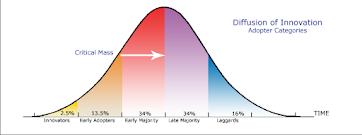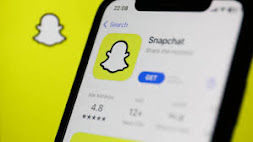Final Post: A Take on Technology
Technology has essentially taken over our lives and we have discussed plenty of instances of this in class, from the impact of new technological inventions to the impact AI has had on people's livelihoods and privacy. Personally, I think that technology has become a big part of my life, but I don't think that I've let it consume me completely. I have Snapchat, Instagram, and Tik Tok, but I have time limits on all three apps. I allow myself to use each app everyday roughly for one hour and 30 minutes. There are days where I follow this time limit, however there are also days where I decide that I want to be on these apps longer. Even though I start out practicing good habits with my time management on my phone and social media, sometimes I fall into the addictive trap. I've learned to resist the urge to keep scrolling on these apps, because as I've gotten older, I have realized that time goes by so quick, and I want to do productive and fun things in my life. I feel that if I didn't have this mindset, I would miss out on so many memories and would miss out on making meaningful relationships too. I don't want to walk around like a zombie and not pay attention to my surroundings and the people I love. The world would be so bland and this startled me as I watched this video. I may still be connected to my phone and may break my limit on my phone at times, but I certainly am glad that I'm not constantly posting or seeing others' content. I have learned that posting on my social media accounts gives me so much anxiety, because I constantly worry about what people will think of the pictures or videos I post. Therefore, I don't post a lot on any of the platforms I've listed, because I want to avoid being judged by people as much as I can. I would definitely say that social media has made me insecure at times, because I believe that the beauty standards surrounding social media are simply unrealistic. I want to avoid the chances of me feeling like I'm not enough in comparison to others, so that is another reason why I have a time limit for certain apps on my phone. I think that a lot of individuals fall victim to social media's addictive cycle, and I see through myself, my friends, and my younger sisters just how damaging social media can be. Hurtful comments or simply not looking like the people we see on social media can make us question our personalities and bodies. I don't think it's fair to any of us to think that we must fit a certain category or post certain things to get more likes or followers. I think social media can be an incredible platform to create change and to increase positivity across the world, but I think that more and more influencers need to show the more natural parts of themselves. If social media continues to become a less judgmental place and if people show aspects of their true selves on there, I think that it will evolve to a place where people feel comfortable posting and can stay connected to friends and family by doing so.I think that technology is awesome for everyone because we are capable of learning new things and can stay in contact with another, with just a push of a button. Technology opens the doors to so many new opportunities, but it also opens the door to misinformation, insecurities, cyberbullying, and intense harassment. I've already discussed misinformation and insecurities, which have affected me, my friends, and family. I've had numerous conversations with people I know about how easy it is to be misinformed on the internet, because people are very good at making false information look real. The cycle of fake news evolves as we pass along information that we think is true to others. I know we have all been there, where we instinctively trust that information is true and are simply too lazy to check if the source is correct or not. So once again, we all hate being misled, so check your sources before sending it along to your family and friends! Unfortunately, I've also had many conversations about the insecurities created by either posting or looking at social media posts with the people I care about. I don't think that this topic is talked about enough, but it is refreshing to see that influencers are being more transparent with their audiences. I think that it is especially important for society to keep striving towards having no beauty standards, because younger children especially are so impressionable. I have three younger sisters at home, and I don't want them to grow up and feel that they aren't accepted or shouldn't express themselves, because they don't look like every model or influencer.
I also believe that these beauty standards have resulted in cyberbullying, because people expect others to look a certain way and when they don't, people hide behind screens and bash them. However, I'm sure many of these people who make these mean comments online are most likely insecure themselves because they feel pressured to feel a certain way and don't. The internet and social media can be a scary place for everyone, and I think that it is especially important to teach the younger generations how to be safe online. For instance, Sonia Bokhari is saving herself from the horrors of social media, because she has learned that not everyone is who they say they are on the internet, and she doesn't want to risk putting herself in harm's way. I don't think that a lot of people know the dangers of being online, but I think we need to increase our internet safety awareness in classrooms from a very young age, because more and more young children are getting phones and social media. I sense it with my youngest sister who is 9, she feels like if she doesn't have social media she is out of the loop and she's fearful of missing out. However, I think that it should be made apparent to children that they aren't missing out and that the internet has a lot of bad people on it. So even though technology offers us a lot of awesome opportunities, I think that we should be mindful of the damage that could be done to anyone with access to phones, laptops, tablets, etc.
I am very proud of my digital footprint because it does not consist of anything inappropriate or anything that could get me in trouble with school or with future employers. I pride myself on being smart on the internet because I know that I would be devastated if something happened to my future education or career. All it takes is one stupid mistake and your life could be over, so I think that we all need to be mindful of what we post, because schools and employers look up your name to see the representation that you will be bringing to their school or workforce. My digital footprint consists of my basketball highlights from high school, my achievements from high school and college, and my involvement in the newspaper called the View Point. I think that this digital footprint will make me look good to employers and can put me ahead of other possible employees. None of my social media accounts or posts come up, but if any employers went to look those up, my posts are all appropriate. I want to have a clean digital footprint, because I know that that footprint will follow me around forever and that in some aspect, it represents me as a person. We should all work on having a cleaner digital footprint to have a better chance at having the jobs and lives that we want. Technology can have many positives and negatives, but I believe that we can capitalize on technology if we learn how to stay safe online and pay attention to our digital footprint, learn how to fact check, and learn how to stay positive as we use technology and social media as well.

































